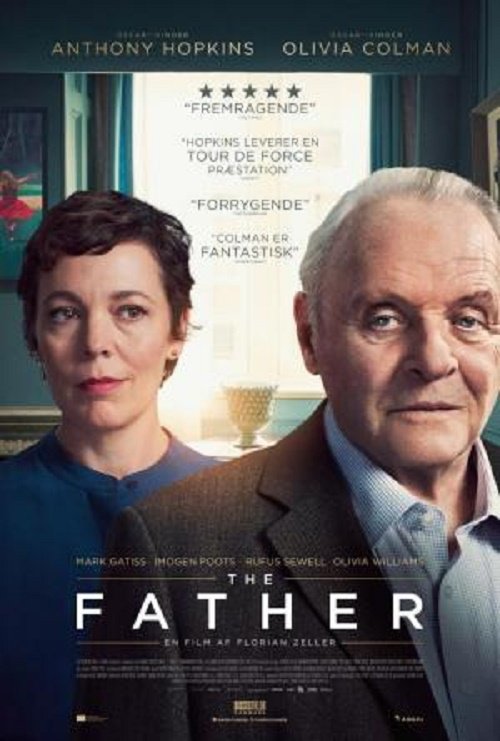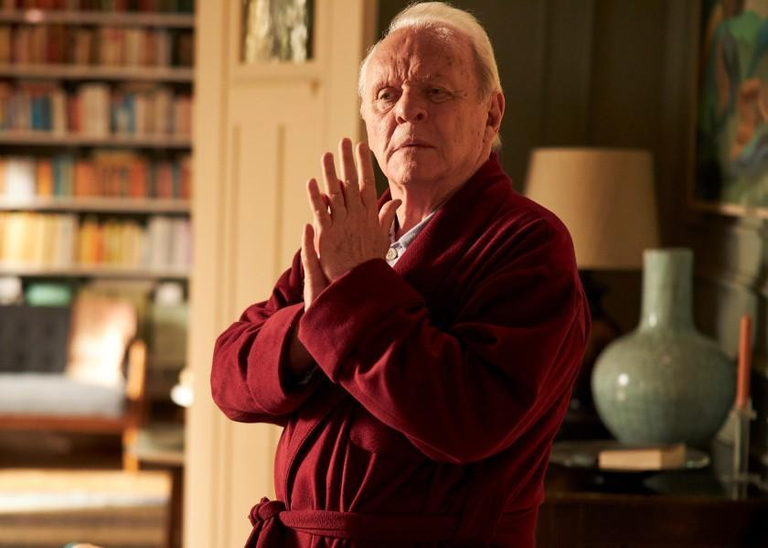"El padre" o los estragos de la memoria (reseña fílmica) | "The Father" or the ravages of memory (film review)
Hace pocos días pude ver un filme que estaba entre mis pendientes, El padre, la primera realización del dramaturgo francés Florian Zeller, con la cual debutó exitosamente en 2020. La crítica lo acogió muy ampliamente, así como en varios festivales de cine europeos. Ha recibido varios premios, entre ellos dos Óscar en el 2021: mejor guion adaptado y mejor actor otorgado al gran Anthony Hopkins.
A few days ago I was able to see a film that was among my pending, The Father, the first realization of the French playwright Florian Zeller, with which he successfully debuted in 2020. It was very widely acclaimed by critics, as well as at several European film festivals. It has received several awards, including two Oscars in 2021: best adapted screenplay and best actor awarded to the great Anthony Hopkins.

El padre está basado en una obra teatral estrenada por Florian Zeller en 2012. Zeller es considerado uno de los más importantes dramaturgos franceses de la actualidad, y su obra teatral, de gran éxito, "una de las mejores de la década", según The Times.
Narra el deterioro mental, producto de la demencia senil, de un anciano a sus 80 años, quien, un poco huraño y testarudo, se confronta con su hija viva (la otra murió en un accidente) y su solicitud de ser atendido por una cuidadora. Terminará en un asilo, pero antes seremos observadores, comprometidos emocionalmente, con los juegos confusos de la mente del anciano, en los que los tiempos y los personajes de su vida se alteran.
Asistimos a dos sobresalientes actuaciones, la magistral de Anthony Hopkins en la interpretación del anciano de nombre Anthony, por cierto (muy cercano a su edad), una de las más destacadas de su dilatada carrera actoral. Conectamos con este viejo intransigente y descortés, a veces detestable, otras veces querido, y nos dejamos llevar por su drama vital interior hasta el final conmovedor.
De otro lado, la interpretación de Anne, la hija de Anthony, que ama hasta el desgarramiento a su padre, y no puede abandonar, pese al maltrato recibido a menudo por parte de este. La caracterización de este enternecedor personaje por parte de esa dama del cine que es Olivia Colman es también excelente.
The Father is based on a play premiered by Florian Zeller in 2012. Zeller is considered one of the most important French playwrights today, and his highly successful play "one of the best of the decade," according to The Times.
It narrates the mental deterioration, a product of senile dementia, of an old man in his 80s, who, a bit sullen and stubborn, is confronted with his living daughter (the other died in an accident) and his request to be cared for by a caregiver. He will end up in a nursing home, but first we will be observers, emotionally engaged, with the confused games of the old man's mind, in which the times and characters of his life are altered.
We witness two outstanding performances, the masterful one by Anthony Hopkins in the interpretation of the old man named Anthony, by the way (very close to his age), one of the most outstanding of his long acting career. We connect with this intransigent and discourteous old man, sometimes detestable, sometimes loved, and we are carried away by his inner life drama until the touching ending.
On the other hand, the performance of Anne, Anthony's daughter, who loves her father to the breaking point, and cannot give up, despite his frequent mistreatment of her. The characterization of this touching character by that lady of cinema Olivia Colman is also excellent.
Sin duda, es un filme de actuaciones, que no oculta su origen teatral, sin que esto se convierta en una desventaja. Antes bien, nos sitúa completamente en el conflicto interpersonal e interior de los dos personajes protagónicos, sin prestarse a distracciones adicionales. Nos renueva nuestra apreciación de cineastas que hicieron esto en décadas anteriores, como Ingmar Bergman o Joseph Losey, por citar a dos grandes.
Por ello todo ocurre en interiores, bien sea en el apartamento de Anthony o Anne, o en el asilo. Apenas se nos muestra en dos o tres oportunidades, una vista de la calle, y la observamos por la mirada (cámara subjetiva) de Anthony. Y a propósito del espacio, vale destacar tanto la ambientación como la fotografía.
El espacio escénico fue estéticamente concebido para que, a través de la fotografía y los movimientos de cámara, nos sintiéramos como habitantes de él, compartiendo la suerte de sus moradores, particularmente del anciano. Como en todo espacio cerrado (un apartamento), lo que resaltan son sus paredes, pasillos, puertas, mobiliario, que apreciamos por una fotografía lumínica, poco penumbrosa -casi como en pinturas de Edward Hopper-, con planos de conjunto y medios, en movimientos de cámara predominantemente de rotación o fijos.
Undoubtedly, it is a performance film, which does not hide its theatrical origin, without this becoming a disadvantage. Rather, it places us completely in the interpersonal and inner conflict of the two main characters, without lending itself to additional distractions. It renews our appreciation of filmmakers who did this in previous decades, such as Ingmar Bergman or Joseph Losey, to name two greats.
Thus everything takes place indoors, either in Anthony's or Anne's apartment, or in the asylum. On only two or three occasions are we shown a view of the street, and we observe it through Anthony's gaze (subjective camera). As for the space, it is worth mentioning both the setting and the photography.
The scenic space was aesthetically conceived so that, through the photography and camera movements, we feel like inhabitants of it, sharing the fate of its inhabitants, particularly the old man. As in any enclosed space (an apartment), what stands out are its walls, corridors, doors, furniture, which we appreciate through a luminous, dimly lit photography -almost like in paintings by Edward Hopper-, with overall and medium shots, in predominantly rotating or fixed camera movements.

La presentación de la historia, su discurso, está impregnado por una temporalidad muy interior y esencial. Más que tiempo, es tempo, en el sentido psicológico (duración bergsoniana) o musical. Y este es otro componente clave del filme. La música fue hecha por ese compositor contemporáneo de suma simpatía (me incluyo entre los primeros), cuya obra está signada por la presencia del alma, diría James Hillman; me refiero a Ludovico Einaudi. Tanto su música, como otras piezas escogidas (como "Casta Diva" de Bellini), sumergen al filme en un ambiente anímico proclive a la empatía espiritual.
The presentation of the story, its discourse, is impregnated by a very interior and essential temporality. More than time, it is tempo, in the psychological (Bergsonian duration) or musical sense. And this is another key component of the film. The music was made by that contemporary composer of utmost sympathy (I include myself among the former), whose work is marked by the presence of the soul, James Hillman would say; I am referring to Ludovico Einaudi. Both his music, as well as other selected pieces (such as Bellini's "Casta Diva"), submerge the film in a soulful atmosphere prone to spiritual empathy.
Un filme que si no ha visto, y es amante de realizaciones de calidad, no fáciles, se los recomiendo sin miramientos.
A film that if you have not seen, and are a lover of quality productions, not easy, I recommend it without reservation.
Referencias | References:
https://es.wikipedia.org/wiki/El_Padre_(pel%C3%ADcula)
https://en.wikipedia.org/wiki/The_Father_(2020_film)
https://es.wikipedia.org/wiki/Florian_Zeller
https://en.wikipedia.org/wiki/Florian_Zeller
https://www.filmaffinity.com/ve/film701512.html

Gracias por su lectura | Thank you for reading.





https://inleo.io/threads/josemalavem/re-josemalavem-2lqknpbrr
The rewards earned on this comment will go directly to the people ( josemalavem ) sharing the post on LeoThreads,LikeTu,dBuzz.
Excelente película y merecido premio Oscar para Hopkins. Me encanto el film.
Gracias por tu visita y comentario, @jcrodriguez. Es muy buen filme. Saludos.
Esta película a mi me encantó, es una de mis favoritas y me cautivó con su historia. Le recomiendo ver El Hijo, del mismo director de El Padre. Ambas son excelentes.
Agradezco tu visita, @pannavi. Veré si puedo conseguir El hijo; me interesa. Saludos, @pannavi.
Una película maravillosa, ambos actores impecables, aunque sin duda es Hopkins el más merecedor de todos los elogios. Amé esta película.
Por supuesto que concuerdo con tu apreciación. Gracias por tu comentario, @gorayii.
No he tenido la oportunidad de verla pero me propondré hacerlo porque me encantan las películas de Hopkins